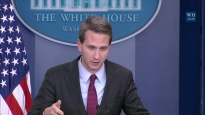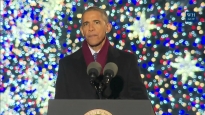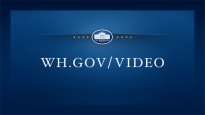U.S.-Russia Business Summit
June 24, 2010 | 14:10 | Public Domain
President Obama and President Dmitry Medvedev of Russia speak about developing innovation and modernization as well as building stronger economic ties at the U.S-Russia Business Summit in Washington, DC.
Remarks by President Obama and President Medvedev of Russia at the U.S.-Russia Business Summit
3:08 P.M. EDT
PRESIDENT OBAMA: Well, good afternoon, everybody. It is a pleasure to be here with my friend and partner, President Medvedev, and I want to thank him again for his leadership, especially his vision for an innovative Russia that’s modernizing its economy, including deeper economic ties between our two countries.
I want to thank the leaders who are guiding the discussion today -- my Commerce Secretary Gary Locke and Minister Nabiullina. I always have a little trouble with that one. (Laughter.) They say the same thing about Obama. (Laughter.)
We are joined by our United States Trade Representative, Ambassador Ron Kirk, and our great ambassadors John Beyrle and Sergey Kislyak.
And I want to also thank the U.S. Chamber of Commerce, the U.S.-Russia Business Council, the American Chamber of Commerce in Moscow, and all the organizations who helped bring our countries together not just today but every day.
Many of you joined us at the business summit during my visit to Moscow one year ago, and it is good to see you again. I noted then that you’re part of a long tradition of commerce and trade between our peoples. Long before Russia and the United States even exchanged ambassadors, we exchanged goods.
In fact, before coming to Washington, President Medvedev visited California and Silicon Valley to explore new partnerships in science and technology and in venture capital. And while there, he pledged Russia’s support to preserve the historic Fort Ross in Sonoma County -- an enduring reminder of the early Russian settlements and trade that brought Russian goods to our young nation.
Some have even wondered whether our Declaration of Independence may have been signed with goose quills from Russia. More than 200 years later, it’s a sign of the times that during his visit to Silicon Valley, President Medvedev opened his own Twitter account. I have one as well. And I said during our press conference today that we may be able to finally get rid of those old “red phones.” (Laughter.)
As we all know, despite the surge in trade in recent years, the economic relationship between the United States and Russia is still largely one of untapped potential. And I pointed out last year that our trade with Russia is only about the same as our trade with Thailand -- a country with less than half the population of Russia. So obviously there’s more work to do.
That’s why part of the reset of the U.S.-Russia relationship required us creating the U.S.-Russia Bilateral Partnership Commission -- Presidential Commission -- to explore a whole range of new opportunities, including economic partnerships that create jobs and opportunities for both our peoples. And under Secretary Locke and Minister Nabiullina’s leadership, that’s what we have done.
Companies represented here today are moving forward with a series of major trade and investment deals that will create jobs for both Americans and Russians across many sectors, from aerospace, to automotive engineering, to the financial sector and high-technology.
I am especially pleased that Boeing and Russian Technologies are moving forward with a $4 billion deal on 50 Boeing 737s. This is a win for Russia, creating a long-term market for its raw materials and resulting in modern airplanes for Russia’s travelers.
It’s obviously a win for the United States, because this partnership could add up to 44,000 new jobs in the American aerospace industry. This reflects my administration’s National Export Initiative, and it’s a perfect example of the shared prosperity —- and the high-tech jobs that we can create together.
So today, President Medvedev and I agreed to expand trade and commerce even further. We agreed to deepen our collaboration on energy efficiency and clean energy technologies. We reached an agreement that will allow the United States to begin exporting our poultry products to Russia once again. Chicken is important. (Laughter.)
I want to again thank President Medvedev and his team for resolving this issue, which is an important signal about Russia’s seriousness about achieving membership in the World Trade Organization. And that’s why I told President Medvedev that our teams should accelerate their efforts to work together to complete this process in the very near future.
I believe that Russia belongs in the WTO. That’s good for Russia. It’s good for America. And it is good for the world economy.
I pledged to President Medvedev that the United States wants to be Russia’s partner as he pursues his vision of modernization and innovation in Russia, including his initiative to create a Russian Silicon Valley outside of Moscow. American companies and universities were among the first to invest in this effort. And I’m pleased that a number of you here today are going to be working with it as well.
Now, there’s still a lot more that we can do to encourage trade and investment. And obviously in Russia -- and President Medvedev and I discussed this -- issues of transparency and accountability and rule of law remain absolutely critical. This is the foundation on which investments and economic growth depends. And I very much appreciate and applaud President Medvedev’s efforts in this area.
Today, we took another step forward. Our two governments are making a joint commitment to open government that fosters transparency and combats the corruption that stifles economic growth.
Of course, ultimately, it’s you -— the private sector, our entrepreneurs -— who create jobs and unleash economic growth. It’s the market that’s been the most powerful force in history for creating opportunity and prosperity. It’s not the resources we pump or pull from the ground. It’s the imagination and the creativity of our people, our workers, and their dreams for themselves and their children that ultimately drives the modern economy.
Last year in Moscow, I learned a Russian proverb, which says, “Every seed knows it’s time.” A year ago, we planted a seed of cooperation and commerce. And today, that cooperation is bearing fruit -- with new partnerships and prosperity for both our peoples. And I think that if we stay on the course that we’re on, with a spirit of mutual respect and mutual interest, we are going to make even more progress, sell more goods, create more jobs, get more cross-border financing than ever before.
So, President Medvedev, welcome. Thank you to all the business people who are visiting here from Russia and your ministers. Thank you for your vision and your determination to continue to move us towards a brighter vision of our future.
Thank you.
PRESIDENT MEDVEDEV: (As translated.) Ladies and gentlemen, dear colleagues, it’s been a year since we met in order to discuss affairs -- business affairs, and a lot of water has flown from the time, as we used to day.
There are certain moments that distinguish this meeting from the meeting in Moscow. First of all, it is much hotter here, so it is more difficult to work.
At the same time, we are all seated and back in Moscow, we were standing with Presidents. So it is easier to work. And this isn’t a significant difference, but speaking in serious term, during this year, we have changed a lot. The world economy has changed. And we were working very hard in order to improve the situation in our national economy in order to re-launch failed mechanisms in international economy. And certain persons present here just worked to save their businesses. In general, we managed to do so, although we did have problems.
Today we discussed different issues with President. After that -- after my visit to the Congress, I’ll fly to G20. And tomorrow we are willing to continue discussing economic issues during the G8 summit, and later on during the G20 summit. We will think on how to build our future.
And our future depends to a great extent on our bilateral relations and on relations our countries have with other partners, and on relations between the U.S. and Russia.
The agenda that I had in the U.S. was very interesting, very intensive. For the first time in my practice, I visited not only the capital or New York, but I also visited California. And I was deeply impressed by what I saw there. Part of my delegation accompanied me. Part of the delegation witnessed how business is organized in the Silicon Valley.
We have things to learn from that experience; I already said that during the press conference. And I hope that this context will provide for better opportunities to implement our agenda that we proposed for our economy, to modernize our economy in accordance with five presidential priorities: first, medicine; energy efficiency; nuclear technologies; computer technologies; and outer space programs.
We are creating a new center of innovative developments in Skolkovo, outside of Moscow. And I think that the U.S. experience, we will be able to apply this experience in our country, of course, introducing necessary changes.
And I’m very grateful to the U.S. businessmen who expressed their desire to work in this direction and adopted a series of decisions. We value this very much and we will be thinking how to create the most favorable, most protected conditions for such work.
Speaking about our Silicon Valley, about the Skolkovo project, we in Russia adopted an unprecedented measure. We established a special legal framework -- I adopted a special law and we’re going to apply tax facilitation and also introduce a number of regimes to provide for better conditions of work. We are convinced that the U.S.-Russia economic potential is great.
At the same time, due to the crisis and to the difficulties which we had in our relations a certain time ago, this potential has not been tapped. And the volume of investments do not respond to what we need. It is evident that we want this volume to grow -- both investments of the United States into Russia and vice versa, because it’s not a one-way road. The economy is global, and we most create reasonable rules of -- and assist each other to overcome different difficulties.
Recently we signed a series of documents -- we recently held an economic forum in Russia and signed documents between U.S. and Russian companies. Here we signed agreements as well. This is a good sign. I am convinced that in the future with my friend and partner, President Barack Obama, we will control this process, we will assist this process, because to my mind, this is a very important element of our interstate relations.
We will work personally and in the framework of the Presidential Commission established a while ago, but we also pin our hopes on the U.S.-Russia Business Dialogue established two years ago. We have representatives of this dialogue in this hall, and I’m very pleased that we are interacting on this topic and that eventually our joint projects will help us to overcome the difficulties threatening our economies, the world economy.
We still have to do a lot -- to do a lot internationally and to do a lot with respect to our national legislations. President Obama is doing great work. We understand how difficult this work is because each solution has both persons who are in favor and who are against. But it is evident that the world economy and the world itself has changed. And we will have to change the rules, although everybody present in this hall are committed to modern economic approaches and are committed to a free market.
At the same time, we should understand that the 21st century has come, and therefore take into consideration the global economic processes. Our cooperation should develop every year. I believe that our cooperation is very promising, and it’s very good that we met here again to discuss the future of U.S.-Russia business relations. Thank you.
END
3:22 P.M. EDT
|
December 2, 2016
|
December 2, 2016
|
December 2, 2016
|
December 1, 2016
|
|
December 1, 2016
|
November 30, 2016
|
November 30, 2016
|
November 30, 2016
|
- &lsaquo previous
- …
- 4
- 5
- 6
- 7
- 8
- 9
- 10
- 11
- 12
- …
- next &rsaquo







